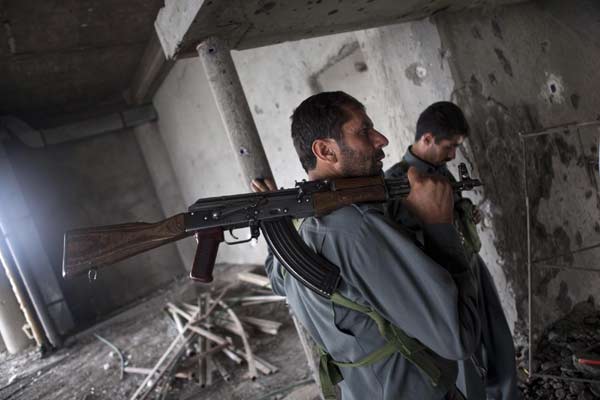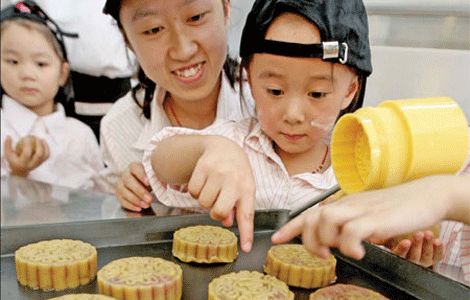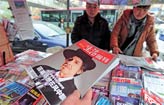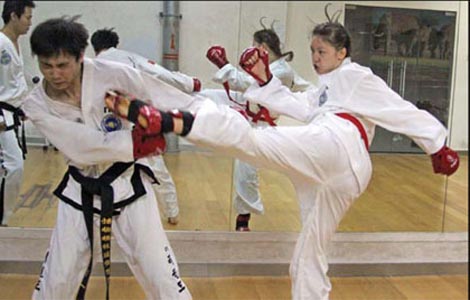Photos
27 killed as Taliban's Kabul siege ends
Updated: 2011-09-15 07:23
By Mirwais Harooni and Sanjeev Miglani (China Daily)
 |
|
An Afghan policeman inspects a building after a battle with Taliban insurgents near the U.S. embassy in Kabul Sept 14, 2011. [Photo/Agencies]
|
It was the longest and most audacious militant attack on the Afghan capital in the decade since the Taliban were ousted from power and a stark reminder of the insurgents' resources and reach as Western forces start to return home.
US Marine Corps General John Allen, the top commander for NATO and US forces in Afghanistan, said the Kabul attack had left 27 dead, including Afghan police, civilians and insurgents.
Allen said that 11 insurgents died in the battle, seven of them in the clearing operation inside the building where the attackers were holed up near the US embassy. Four other attackers served as suicide bombers.
The insurgents had holed up in the multi-story building still under construction and launched their attack early on Tuesday afternoon, firing rockets toward the US and other embassies and the headquarters of NATO-led foreign forces.
The suicide bombers also targeted police buildings in other parts of the city.
Explosions were interspersed with gunfire all afternoon on Tuesday and continued past dawn on Wednesday.
Bullets hit the walls of a compound housing the Xinhua News Agency, and one rocket landed in a neighboring yard, smashing windows, said Yan Jianhua, a Xinhua correspondent stationed in Kabul.
Residents of nearby apartments stayed indoors as helicopters flew low overhead.
"The noise (of helicopters) was so loud that our beds shook," Yan said.
The militants were armed with rocket-propelled grenade launchers, AK-47 assault rifles and suicide bomb vests.
US Ambassador Ryan Crocker said around six or seven rockets had landed inside the embassy perimeter during the initial hours of the attack, but said the range meant they had not posed a serious threat. He believed the Haqqani network was behind the attack.
Named after its leader, Jalaluddin Haqqani, the network is one of three, and perhaps the most feared, of the Taliban-allied insurgent factions fighting US-led NATO and Afghan troops in Afghanistan.
The raid was another sign that security has deteriorated sharply in Kabul, and was the latest in a string of attacks on Western targets in recent months.
Suicide bombers targeted the British Council in mid-August in the city, killing nine people. In late June, insurgents launched an assault on a hotel in the capital frequented by Westerners, killing at least 10 people.
In Beijing, a Foreign Ministry spokeswoman on Wednesday called for stability in Afghanistan.
"As a friendly neighbor, China hopes that Afghanistan will soon stabilize, achieve ethnic reconciliation and peaceful reconstruction," Jiang Yu said.
She also stressed the huge responsibility involved in ensuring that the Afghan forces were fully capable of handling security as more foreign troops leave.
Dong Manyuan, a counter-terrorism expert at the China Institute of International Studies, called the attack "unprecedented", and said it reflected the Taliban's growing strength and ability "to strike at any target at will".
NATO began to hand over its security responsibilities to Afghan forces in July. A staged withdrawal, due to finish in 2014, will involve 140,000 NATO-led troops, including nearly 100,000 US soldiers.
Dong said the Taliban is taking advantage of the planned withdrawal and will continue to launch attacks.
AFP, AP, Wang Yan and Cui Haipei contributed to this story.
E-paper

Way over the moon
High inflation rockets mooncake prices out of orbit for mid-autumn festival
From death matches to child's play
Tomb raiders remain a menace
Kicking for joy
Specials

Singing success
Western musicians bring much-needed impetus to live performance industry

Salary bonanza for bosses
Top boss gets 8.78 million euros a year, far more than the State enterprise CEO with highest pay

Kicking for joy
Swedish college student represents China in Taekwondo championships
